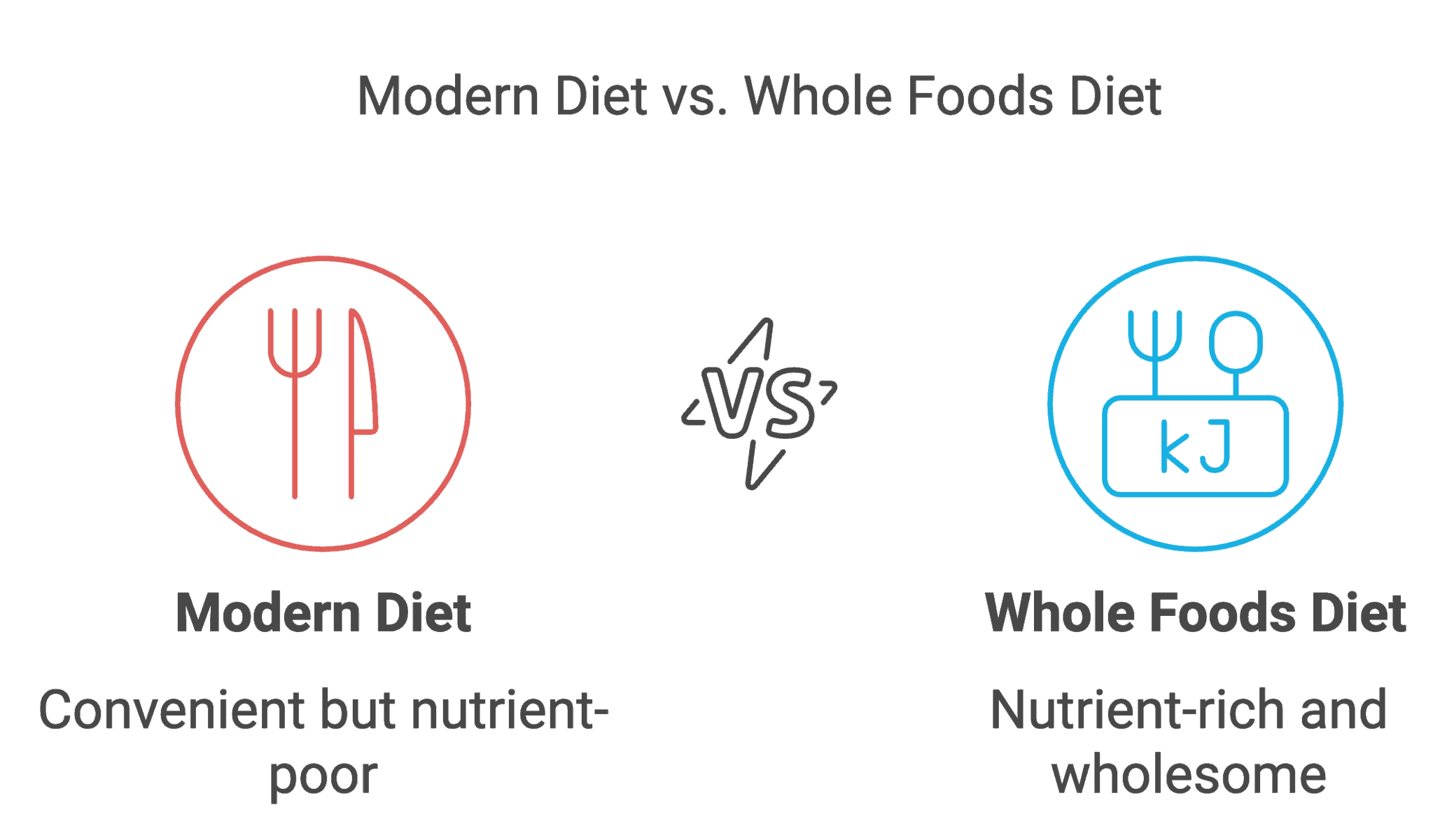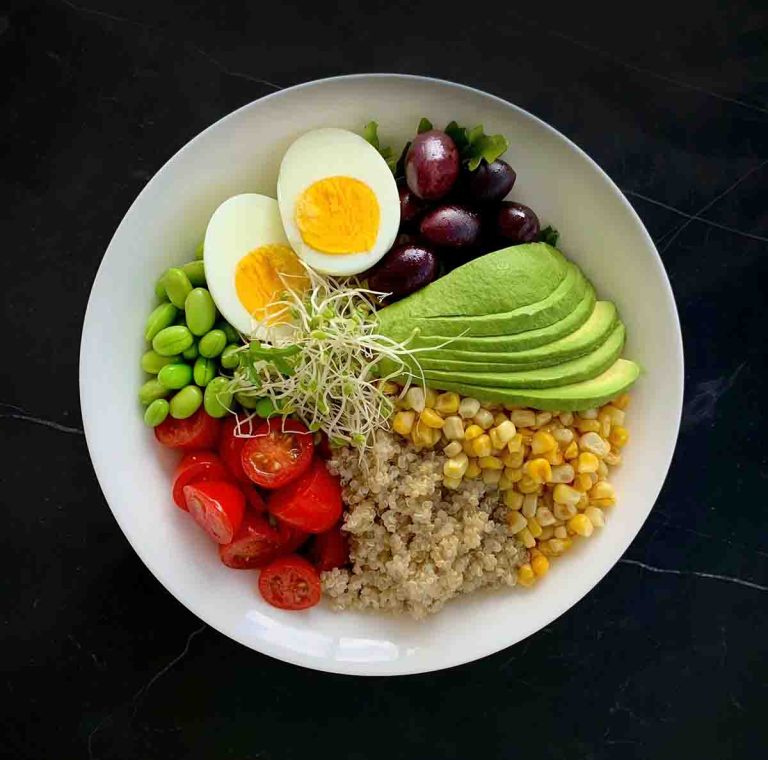On this page:
The Modern Diet Dilemma
In our fast-paced world, convenience often trumps nutrition. The modern diet, characterized by processed foods, refined sugars, and unhealthy fats, has become the norm for many. While these foods might satisfy our immediate cravings, they often fall short in providing the essential nutrients our bodies—and especially our skin—need to thrive.

This shift in eating habits has far-reaching consequences, particularly in terms of nutrition. The problem lies not just in what we’re eating, but also in what we’re not eating.
Our ancestors consumed a diverse range of whole foods, rich in natural vitamins, minerals, and antioxidants. In contrast, today’s typical diet is often lacking in these high quality nutrients. This shift has created a paradox: we’re often overfed yet undernourished [1].
The impact of these nutritional shortfalls is particularly evident in our skin health and appearance.
As our body’s largest organ and first line of defense, our skin relies on a range of nutrients for optimal skin health and a youthful appearance. When these nutrients are in short supply, the aging process can accelerate, leading to premature wrinkles, loss of elasticity, and a dull complexion.
While appearance matters, skin health reflects deeper physiological processes. The health of our skin is a reflection of our overall well-being.
Nutrient deficiencies can compromise our skin’s ability to protect us from harmful UV rays, pollution, and other environmental toxins. This, in turn, can lead to increased inflammation and oxidative stress, further exacerbating the aging process.
Understanding the link between nutrition and skin health is key to combating premature aging and maintaining overall wellness.
How can I make my skin healthier?
Stay hydrated, use sunscreen daily, eat a balanced diet rich in antioxidants, get adequate sleep, and follow a consistent skincare routine using gentle products suitable for your skin type.
What defines skin health?
Healthy skin is smooth, hydrated, and free from persistent inflammation. It has even tone, intact barrier function, and normal cell turnover. It should feel comfortable, not tight or irritated.
What are the 5 basics of skin care?
- Cleanse gently twice daily
- Moisturize while skin is damp
- Apply broad-spectrum sunscreen daily
- Remove makeup before bed
- Avoid harsh products and excessive touching
What causes poor skin health?
Poor diet, dehydration, lack of sleep, sun damage, stress, harsh products, environmental pollutants, and inadequate cleansing. Medical conditions and hormonal changes can also impact skin health.
How to get clear skin in 7 days?
While complete skin transformation takes longer than a week, you can improve appearance by:
- Following a consistent gentle routine
- Drinking more water
- Getting 7-8 hours sleep
- Avoiding dairy and sugar
- Using non-comedogenic products
- Changing pillowcases regularly
How can I improve weak skin?
Focus on strengthening your skin barrier with gentle, fragrance-free products containing ceramides and hyaluronic acid. Use a mild cleanser, avoid hot water, apply moisturizer to damp skin, and protect from sun damage. Consider products with niacinamide or collagen-boosting peptides. Ensure you include collagen sources in your diet.
Key Nutrients for Skin Health

Understanding key nutrients for skin health can help us make informed dietary choices. Let’s explore the essential vitamins, minerals, and compounds that contribute to vibrant, youthful skin.
- Vitamin C: This powerful antioxidant is crucial for collagen production, which gives skin its structure and elasticity. Vitamin C also helps protect the skin from damage caused by free radicals and UV radiation [2].
- Vitamin E: A potent antioxidant, vitamin E works with vitamin C to protect skin cells and promote overall skin health. It also helps maintain skin moisture and may help reduce inflammation.
- Vitamin A: In its various forms (including retinol and beta-carotene), vitamin A is essential for skin cell turnover and repair. It helps regulate oil production and can improve the appearance of fine lines and wrinkles.
- Omega-3 Fatty Acids: These healthy fats are crucial for maintaining the skin’s lipid barrier, which helps keep moisture in and irritants out. They also have anti-inflammatory properties that can help soothe irritated skin.
- Zinc: This mineral is involved in numerous aspects of skin health, including cell division, protein synthesis, and wound healing. It also helps regulate oil production and can be beneficial for acne-prone skin.
- Selenium: Another antioxidant mineral, selenium helps protect the skin from UV damage and may play a role in preventing certain skin cancers.
- Silica: Often overlooked in anti-aging diets, silica is an essential mineral for supporting skin health. This mineral helps fight aging by boosting collagen synthesis and skin elasticity, while also promoting healthy hair and nails—key factors in maintaining a youthful look.
- B-complex vitamins: These vitamins, particularly biotin (B7) and niacin (B3), are essential for healthy skin, hair, and nails. They help the body convert food into energy and play a role in cell metabolism.
- Polyphenols: These plant-based compounds contribute to skin health with powerful antioxidant and anti-inflammatory properties. They can help protect the skin from UV damage and may slow down the aging process.
While these nutrients play crucial roles in skin health, obtaining them isn’t always straightforward. Modern farming practices and food processing can sometimes deplete the nutrient content of our foods. Additionally, factors like stress, pollution, and certain medications can increase our nutrient needs or impair absorption.
Understanding these nutrients is just the beginning. Their absence can manifest in surprising ways, affecting not just our skin’s appearance but its fundamental health.

The Insulin-Skin Connection
While we often think of insulin in relation to diabetes and blood sugar control, its impact on skin health is both significant and often overlooked. Understanding this connection can provide valuable insights into how our dietary choices affect our skin’s appearance and aging process.
Insulin is a hormone produced by the pancreas that helps our cells absorb glucose from the bloodstream. When we consume foods high in simple carbohydrates or sugar, our blood glucose levels spike, triggering a rapid release of insulin. Over time, frequent blood sugar spikes can lead to insulin resistance, where our cells become less responsive to insulin’s effects.
This insulin-skin connection manifests in several ways:
- Glycation: When blood sugar levels are consistently high, excess glucose molecules can attach to proteins in the skin, particularly collagen and elastin. This process, known as glycation, forms advanced glycation end products (AGEs). AGEs can cause collagen and elastin fibers to become stiff and brittle, leading to wrinkles, sagging skin, and a loss of elasticity [3].
- Inflammation: Chronic high blood sugar levels can trigger low-grade inflammation throughout the body, including the skin. This persistent inflammation can accelerate the breakdown of collagen and elastin, contributing to premature aging.
- Acne: Insulin stimulates the production of androgens, hormones that can increase sebum production in the skin. Excess sebum can clog pores and contribute to acne breakouts.
- Skin Tags: These small, flesh-colored growths are more common in people with insulin resistance or type 2 diabetes.
- Impaired Wound Healing: High blood sugar levels can interfere with the body’s ability to heal wounds efficiently, potentially leading to prolonged healing times and increased risk of scarring.
To support healthy insulin levels and, by extension, skin health:
- Choose complex carbohydrates over simple sugars
- Incorporate protein and healthy fats with each meal to slow glucose absorption
- Practice portion control to avoid overeating
- Engage in regular physical activity, which can improve insulin sensitivity
- Consider intermittent fasting, which may help regulate insulin levels (consult with a healthcare provider before starting any new dietary regimen)
Our skin’s health relies on more than just blood sugar balance. The next piece of the puzzle plays a quiet but crucial role in maintaining our skin’s structure.
The Silica-Skin Connection
When we think of nutrients essential for skin health, silica often doesn’t make the top of the list. However, this trace mineral plays a crucial role in maintaining youthful, healthy skin. Understanding the silica-skin connection reveals a key player in maintaining youthful, healthy skin. This often-overlooked mineral, also known as silicon dioxide, is more prevalent than you might think.
Silica is the third most abundant trace element in the human body after iron and zinc, with the highest concentrations found in connective tissues, including the skin [4].
Silica’s impact on skin health extends far beyond its abundance in the body, offering a range of benefits that support a youthful appearance:
- Collagen Production: Silica is essential for the synthesis and stabilization of collagen, the protein that gives skin its structure and elasticity. As we age, our bodies produce less collagen, leading to wrinkles and sagging skin. Adequate silica intake can help support continued collagen production.
- Skin Hydration: Silica helps the skin retain moisture, contributing to a plump, hydrated appearance. Well-hydrated skin is more resilient and less prone to showing fine lines and wrinkles.
- Skin Elasticity: By supporting collagen and elastin production, silica helps maintain skin elasticity, allowing it to “bounce back” and resist sagging.
- Wound Healing: Silica is involved in the early stages of wound healing and can help promote faster recovery of damaged skin.
- Stronger Hair and Nails: While not directly related to skin, silica’s benefits for hair and nail strength contribute to an overall youthful appearance.
While silica’s benefits are clear, modern diets and aging can lead to deficiencies. Fortunately, several dietary sources, including certain mineral waters, can help boost our silica intake.
One practical source of bioavailable silica is in selected natural mineral water. The silica content in mineral water can vary greatly depending on its source. For example, Spritzer, a popular mineral water brand, is known for its high silica content—making it a good choice for those looking to increase their silica intake through beverages.
Other dietary sources of silica include:
Whole Grains: Brown rice and millet are common in many Asian diets and are good sources of silica. The outer husk of these grains contains a significant amount of silica.
Vegetables: Bamboo shoots, green beans, and leafy greens like bok choy and water spinach are popular in Asian cuisine and contain silica. While the silica content in leafy greens may vary, bamboo shoots are a particularly good source.
Nuts and Seeds: Sesame seeds, which are widely used in Asian cooking, along with sunflower seeds, can contribute to your silica intake.
Seafood: Shellfish like clams, mussels, and oysters are rich in silica and are commonly consumed in many Asian countries.
Herbs and Spices: Horsetail and nettles are among the richest natural sources of silica. But while those two may not be common in Asia, herbs like gotu kola (centella asiatica), widely used in traditional Asian medicine, and ginger can be good alternatives, with gotu kola in particular being a good source of silica.
So while silica plays a crucial role in skin health, other nutrients also impact your complexion. Our skin health often reflects our internal nutritional status, serving as a visible indicator of overall wellness.
How Nutrient Deficiencies Manifest in Skin
Our skin often serves as a visible indicator of our internal health, particularly our nutritional status. Nutrient deficiencies can manifest in various ways on our skin, providing clues to potential imbalances in our diet. Recognizing these signs can help us address nutritional gaps and improve both our skin health and overall well-being.
- Vitamin C Deficiency:
- Rough, dry skin
- Slow wound healing
- Easy bruising
- Keratosis pilaris (small, rough bumps on the skin)
- Vitamin A Deficiency:
- Dry, rough skin
- Poor wound healing
- Acne or breakouts
- Delayed skin cell turnover, leading to a dull complexion
- Vitamin E Deficiency:
- Premature aging signs like fine lines and wrinkles
- Increased susceptibility to sunburn
- Dry, flaky skin
- Omega-3 Fatty Acid Deficiency:
- Dry, itchy skin
- Inflammation and redness
- Increased sensitivity to UV radiation
- Zinc Deficiency:
- Acne or other skin inflammations
- Slow wound healing
- Dry, rough skin patches
- Iron Deficiency:
- Pale skin
- Dark circles under the eyes
- Hair loss
- B-vitamin Deficiencies:
- Dermatitis (skin inflammation)
- Cracks at the corners of the mouth
- Scaly, greasy patches on the face (particularly with B2 deficiency)
- Vitamin D Deficiency:
- Dry, itchy skin
- Increased risk of skin infections
- Slower wound healing
- Silica Deficiency:
- Loss of skin elasticity
- Premature formation of wrinkles
- Brittle nails and hair
It’s important to note that these symptoms can have multiple causes, and a nutrient deficiency is not always the culprit. However, persistent skin issues that don’t respond to topical treatments may be a sign of an underlying nutritional imbalance.
Moreover, nutrient deficiencies often don’t occur in isolation. For example, a diet low in fruits and vegetables might lead to deficiencies in multiple vitamins and minerals, resulting in a combination of skin symptoms.
Addressing these deficiencies often requires a two-pronged approach:
- Dietary Changes: Incorporating a variety of nutrient-dense foods can help ensure you’re getting a broad spectrum of essential nutrients.
- Targeted Supplementation: In some cases, supplements may be necessary to correct severe deficiencies. However, this should always be done under the guidance of a healthcare professional.
While addressing nutrient deficiencies can significantly improve skin health, it’s just one piece of the puzzle. Inflammation plays a crucial role in skin aging, often exacerbated by these same nutritional imbalances.[5]
The Role of Inflammation
Inflammation is a natural and necessary process in the body, playing a crucial role in healing and fighting off infections. However, when inflammation becomes chronic, it can have detrimental effects on our health, including accelerated skin aging. Understanding the role of inflammation in skin health can help us make better choices to support our skin’s longevity and vitality.
This ongoing inflammatory response affects skin health in various ways, including:
- Premature Aging: Inflammatory processes can break down collagen and elastin, leading to premature wrinkles and loss of skin elasticity.
- Uneven Skin Tone: Inflammation can trigger excess melanin production, resulting in hyperpigmentation and age spots.
- Compromised Barrier Function: Chronic inflammation can weaken the skin’s protective barrier, making it more susceptible to environmental stressors and moisture loss.
- Acne and Rosacea: These common skin conditions are often exacerbated by underlying inflammation.
While inflammation impacts skin directly, underlying nutrient deficiencies often fuel this process. Key deficiencies affecting skin inflammation include:
- Antioxidant Deficiency: Vitamins C, E, and A, along with minerals like selenium and zinc, act as antioxidants in the body. When we’re deficient in these nutrients, our bodies are less able to combat oxidative stress, leading to increased inflammation.
- Omega-3 Fatty Acid Imbalance: A diet high in omega-6 fatty acids (found in many processed foods) and low in omega-3s can promote inflammation. Omega-3s, found in fatty fish, flaxseeds, and walnuts, have potent anti-inflammatory properties.
- Vitamin D Deficiency: Vitamin D plays a crucial role in regulating the immune system and reducing inflammation. Low levels of vitamin D have been linked to various inflammatory skin conditions.
- Insufficient Polyphenols: These plant compounds, found in fruits, vegetables, and tea, have powerful anti-inflammatory properties. A diet low in these foods may contribute to increased inflammation.
Armed with this knowledge of inflammation’s effects and nutritional factors, we can take targeted steps to protect our skin:
- Go for Diversity: Consume a variety of colorful fruits and vegetables to ensure a broad spectrum of antioxidants and anti-inflammatory compounds.
- Balance Fatty Acids: Increase intake of omega-3 rich foods and reduce consumption of processed foods high in omega-6 fatty acids.
- Mind Your Gut: A healthy gut microbiome can help reduce systemic inflammation. Include probiotic-rich foods like yogurt, kefir, and sauerkraut in your diet.
- Stay Hydrated: Proper hydration supports the body’s natural detoxification processes and helps maintain skin hydration.
- Manage Stress: Chronic stress can exacerbate inflammation. Incorporate stress-reduction techniques like meditation, yoga, or regular exercise into your routine.
- Consider Targeted Supplements: Under guidance from a healthcare professional, supplements like fish oil, turmeric, or specific antioxidants may help combat inflammation.
Beyond these strategies lies a world of skin-nourishing foods, each with unique benefits for your complexion.
Final Thoughts
The intimate connection between nutrition and skin health is clear: what we eat profoundly influences our skin’s vitality and aging process. Every meal is an opportunity to nourish your skin from within.
But nutrition is just one piece of the puzzle. In our next article, we’ll explore specific foods for skin health and delve into complementary lifestyle factors that contribute to radiant skin.
Be sure to consult your doctor before making significant dietary or lifestyle changes.
Our ancestors consumed a diverse range of whole foods, rich in natural vitamins, minerals, and antioxidants. In contrast, today’s typical diet is often lacking in these high quality nutrients.
[1] Cordain, L., Eaton, S. B., Sebastian, A., Mann, N., Lindeberg, S., Watkins, B. A., … & Brand-Miller, J. (2005). Origins and evolution of the Western diet: health implications for the 21st century. The American journal of clinical nutrition, 81(2), 341-354.
[2] Pullar, J. M., Carr, A. C., & Vissers, M. C. (2017). The roles of vitamin C in skin health. Nutrients, 9(8), 866.
[3] Gkogkolou, P., & Böhm, M. (2012). Advanced glycation end products: Key players in skin aging?. Dermato-endocrinology, 4(3), 259-270.
[4] Martin, K. R. (2007). The chemistry of silica and its potential health benefits. The Journal of nutrition, health & aging, 11(2), 94.
[5] Chen, Y., & Lyga, J. (2014). Brain-skin connection: stress, inflammation and skin aging. Inflammation & Allergy-Drug Targets (Formerly Current Drug Targets-Inflammation & Allergy), 13(3), 177-190.
Photos by Bermix Studio and Amanda Dalbjörn on Unsplash




